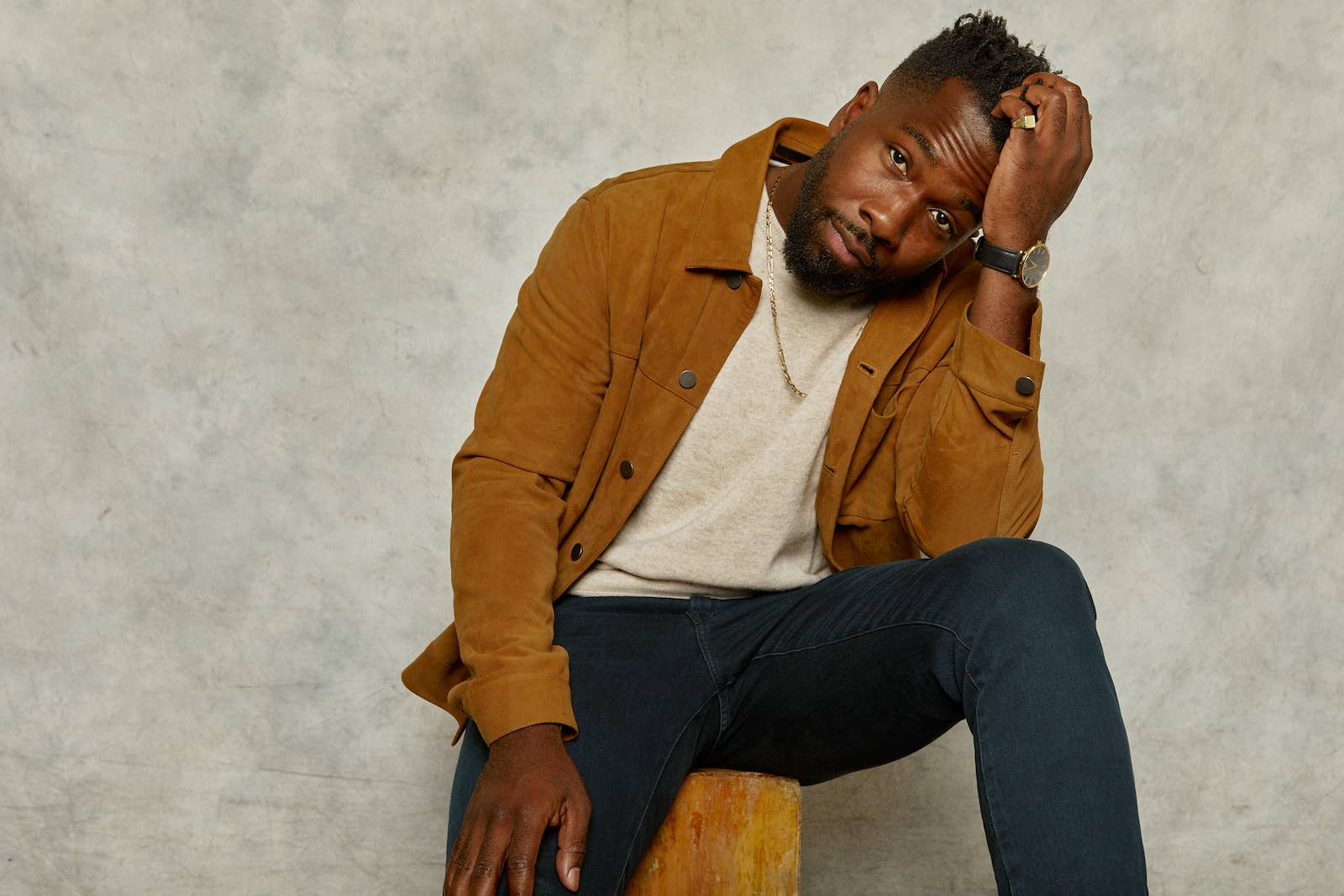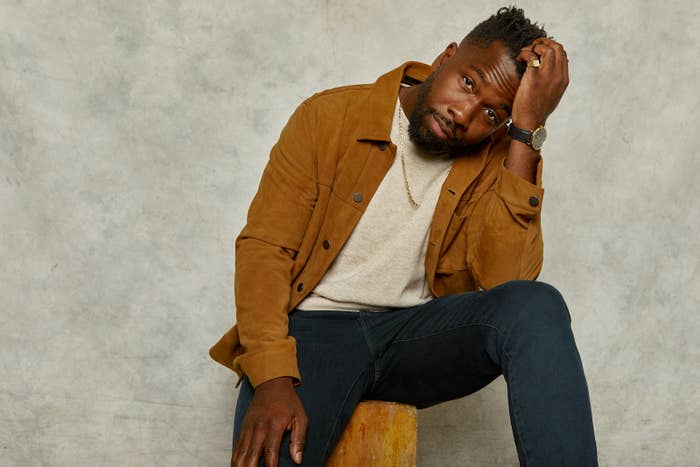
Jean Elie is having one hell of a summer.
Not only did the Insecure alum propose to his longtime girlfriend Randall Bailey while on vacation in Greece in June, but his new ALLBLK original series Send Help will also be debuting on the AMC streaming service on Aug. 11.
The actor is best known for his performance as Issa Rae’s hilarious TV brother Ahmal Dee on the Emmy-award-winning HBO series. His character’s longstanding beef with his sister’s friend Kelli (Natasha Rothwell) provided some of the show’s funniest moments, and he tells Complex that a lot of them were “riffed.” Aside from that role, he has also appeared in the Netflix hit series, Colin in Black and White and previously worked on The Eric Andre Show.
Now he is gearing up for the Send Help premiere, which he created with producing partner Mike Gauyo, who also wrote for Insecure. The new comedy series is inspired by Elie’s personal experiences and it centers around a first-generation Haitian-American named Fritz Jean-Baptiste from Brockton, Massachusetts who is trying to make it in Hollywood while coming to terms with a recent family tragedy. Things seem to be falling into place for Fritz until his show gets unexpectedly canceled, leaving him to deal with his grief, imposter syndrome, and the struggles of having an incredibly demanding Haitian family across the country. (Elie knows those humbling feelings too well; he shares that just minutes after wrapping Season 1 of the show, he got a text saying his mom’s house was at risk of foreclosure.)
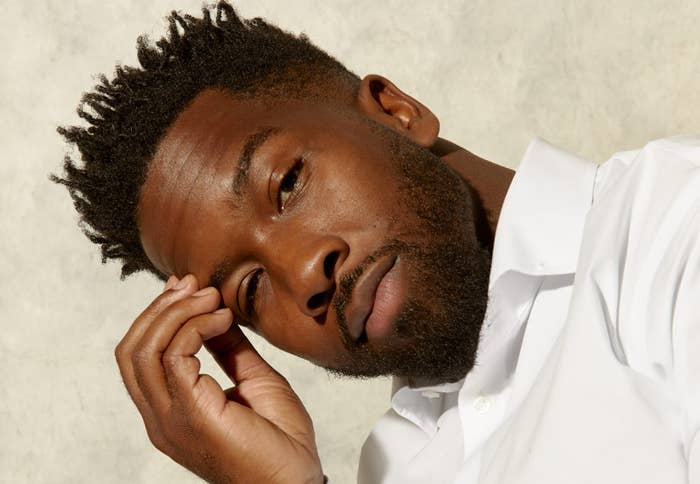
“I’ve constantly been going back and forth with telling this type of story for a very long time and it just rings so true to me,” Elie tells Complex. “What I’ve learned as a creator is to tell the stories that make the most sense to you, because that’s going to resonate with people the most…Especially first-generation Americans.”
While he makes jumping from the Insecure series finale just last year to being the showrunner and starring in his own show look easy, Elie has been putting in the work. During a recent conversation with Complex, the actor shared that he has taken jobs behind the scenes, in writers' rooms, as a production assistant, as an assistant director, and more, just to prepare for this moment. And that’s also because he doesn’t want to do any of it alone. Elie founded his entertainment studio Bassett House Pictures in 2019 with a mission to support and help creators tell stories from and about marginalized cultures the way other people have helped him. Now he hopes to extend to other creators the same level of guidance and support people like Eric Andre and Rae gave him at the start of his career.
Complex sat down for a conversation with Jean Elie where he told us all about his life, creating Send Help, everything he learned from working with Issa Rae on Insecure, and how he was finally able to impress his mother.
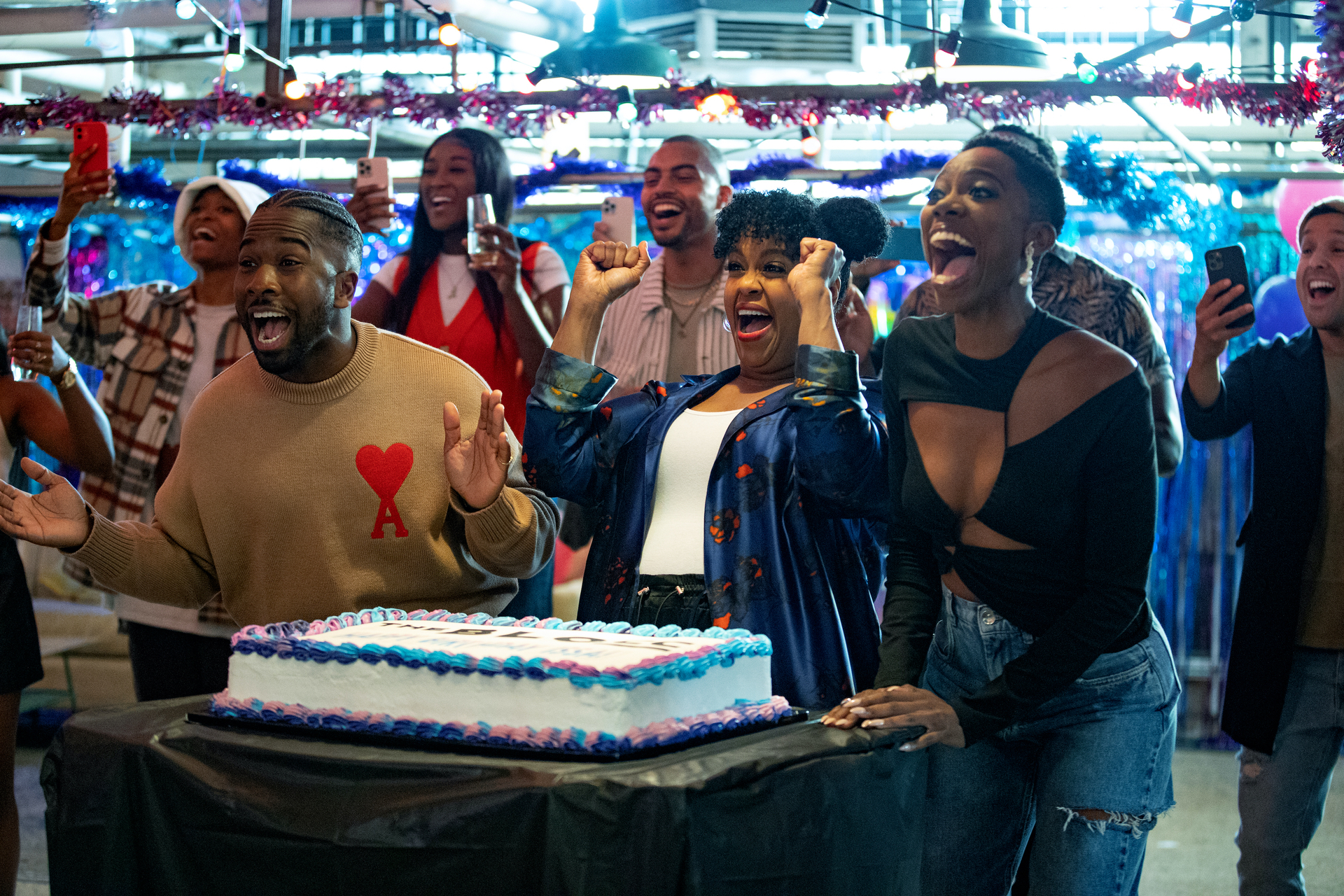
Let’s start with how you felt about Insecure coming to an end.
Jean Elie: Insecure coming to an end was a bittersweet situation because it has literally sprung me and got me where I needed to be creator-wise. It also gave me the knowledge I needed in order to pursue my own endeavors and also write my own seat at the table.
I was able to closely watch people like Issa, Prentice [Penny], Amy [Aniobi], Melina Matsoukas, Ava [Berkofsky], people like Kerry Washington—that was crazy, being directed by her and just being able to be in that space—and in that environment and be able to soak up that information and knowledge and be a sponge to what they’re doing, so I can then translate it to the work I have been doing now. I’m able to graduate and start creating my own content and do my own thing.
For sure.
JE: For it to end in such a beautiful way for fans to feel something and then still want a little more, because I still get the DMs and the tweets. Like, “We need a spin-off of Ahmal,” like, “Why doesn’t he have a spin-off, you and Kelly? When are we going to know about that fight? What’s going on?”
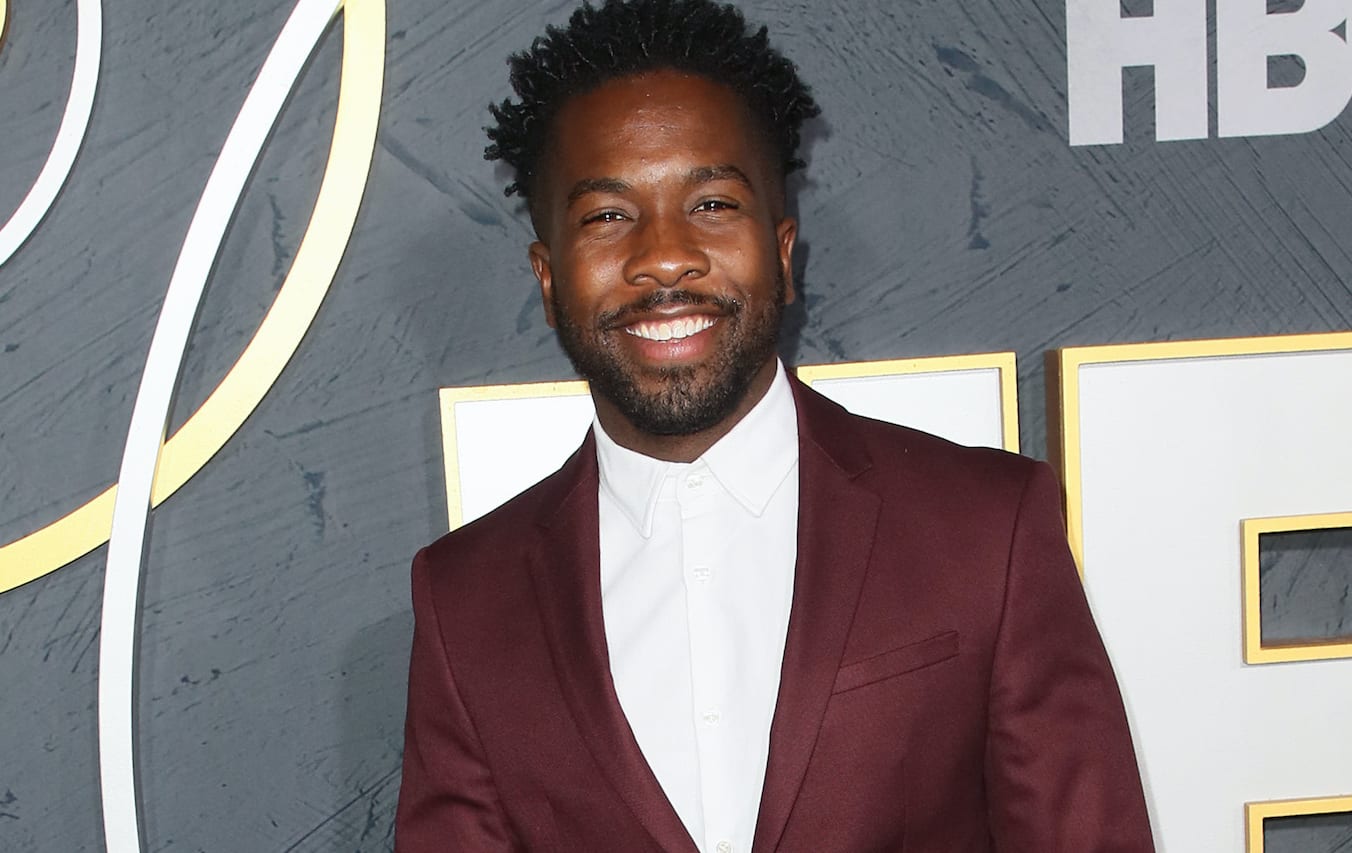
Was your intention when you started your career to be an actor or have you always had the goal of creating and writing your own show?
JE: No. My intention was to just be an actor, honestly. It wasn’t until I got into an acting class at Playhouse West that I learned that this is what I want to do for the rest of my life. But with that, you start realizing that this is also a business. If you want to get ahead and you want to do the roles you want to do, you got to start creating, you got to start putting your money where your mouth is, so I started creating my own content, starting with my roommates over at Bassett House.
It was just more of a necessity that I started creating, and then it just took hold. I just kept nurturing that craft, nurturing that talent, and then working on other productions as a PA, working in the art department, working as an assistant director, just so I can learn the language and be able to talk to everybody in their respective department and be able to handle what I’m doing now. Shit, right now, I’m literally doing post supervising on my own show.
That’s awesome.
JE: Assisting all our editors, VX, post sound, getting everybody on the same accord and trying to speak the language across everybody, to help them get the show made to where we need to be. If you see Beyonce’s last music video, and music album, you’ll see me on it as a credit for a second AD. Literally, I was on that at the same time I was doing Insecure. I’m constantly building myself as a well-rounded creator so I can work with different people across the gamut.
But it also probably makes you a better leader, just to have walked in those people’s shoes.
JE: Yeah. I’m not asking you to do something I wouldn’t do myself. I know the work that comes with whatever it is I’m asking you and I know it’s possible. I know what I’m talking about and they know I’ve been through it. I remember the first time going on Insecure, and a lot of the people that were working behind the scenes worked with me prior to Insecure on music videos and commercials. So when I showed up on set, they were like, “Oh my God. I can’t believe you’re on the other side!” So it was really cool to walk on set to that welcome.
I was reading the synopsis of your show and I think it’s a story that a lot of people will relate to. I don’t know if we’ve seen a lot of shows about Haitian Americans on TV before. What made you want to tell the story and share such a personal journey with the world?
JE: Well, I’ve constantly been going back and forth with telling this type of story for a very long time and it just rings so true to me. What I’ve learned as a creator is to tell the stories that make the most sense to you, because that’s going to resonate with people the most. For instance, not a lot of people know this. Even a lot of the crew didn’t know this. During the process of creating this show, I was dealing with real-life stuff on the other end. I was dealing with my mom potentially going into foreclosure, literally as they said, “That’s a wrap on Jean.” I got a text message two seconds later saying, “Hey, bro, your mom’s house is in foreclosure in 20 days, what do you want to do?”
So I then had to scramble and figure out how to save my mom’s house. She’s good now, I got it settled three days ago, kept pushing back the foreclosure, and got it locked in. But that realness of life, when you’re trying to pursue something that you’ve been dreaming of, is real. That’s going to resonate with a lot of people, especially first-generation Americans, because first-generation immigrants have to be the parent at a very young age. You have to be able to hang out with your friends, but also handle adult business at the same time when it causes us to grow up much faster.
JE: A lot of people don’t know about that. They just don’t get it, or they don’t understand it. Especially if they’re second-generation, third-generation removed from it all, because their parents before them already did it. As a first-generation, your parents did the work of leaving whatever country they were in, coming to the United States and figuring it out, and then trying to give you the tools to survive. But then you have to use the tools that you learned from them and then what you learned in the mistakes to be able to help them survive. I just felt pulled to tell that story, and to tell it through my lens and just put that story out there.
I think that this specifically relates to people who chose a creative career. I feel like for immigrant parents, you have to be a nurse. You have to be a doctor. You have to be a lawyer, an accountant, something that’s “stable.”
JE: Yeah. And it’s safe. It’s because when they came to the States, they were like, “These are the jobs people get and they live good lives.” So they don’t necessarily understand what it means to say, “I’m going to do this over here though. I want to draw. I want to do music. I want to do everything else I’m seeing on TV besides that thing you were trying to coach me on since I was a child to do.” They don’t understand it. One of the biggest moments for me in creating Send Help was inviting my mom to set.
I was able to fly her out, put her in my showrunner’s seat and producer’s seat and take a picture of her in that seat, and for her to actually see what it’s like to create a television show. Because before this, she didn’t really give a fuck. She didn’t care. I would be on Insecure, I did Alvin & The Chipmunks, I did the movie Throwback Holiday, but I was on Insecure before I did Throwback Holiday. I’m like, “Mom, I’m on HBO!” “HBO? Okay, cool, cool.” But once she found out I was on Throwback Holiday on BET, she’s like, “BET! He’s on BET!” Nothing against BET, because BET is an amazing platform. But it’s HBO.
That’s awesome.
JE: Now, after being on set, after seeing the process, after seeing the work that goes into making the television show, she goes back home and tells everybody, “He’s so busy. He has so much work to do.” So that was beautiful.
When you first told your mom, “Hey, I want to be an actor,” what was that initial reaction?
JE: I didn’t tell her. The only person that knew was my older brother. All she knew was I was quitting my job at Sprint, and I was moving to LA. She wasn’t even aware that when I got to LA, the person I was supposed to live with bailed on me at the airport and I had to move in with someone at baggage claim. And I stayed with that person for four months until I moved into Bassett House.
Wow.
JE: She didn’t know about any of that. I just started telling her these stories, and I also started telling her how much I appreciate her hard work in raising me and giving me good morals, and giving me a concrete foundation to stand on in order for me to exist in the world as a man. Because the way she’s worked two jobs, the way immigrant parents work so many jobs just to keep a house, keep a roof over your head, my dad as well, they both took shifts, but it was mainly the kids in the house while the parents worked all day long to make sure they provided for us. And I’m trying to break that generational curse with the work I’m doing and create a real legacy.

How similar is your character Fritz in Send Help to you or did you try to make him a little bit different?
JE: He’s definitely different. I would say he is a very old version of who I am. He’s a very old model. He’s like Jean Elie 1.0, he’s the beta model, trying to figure it out, trying to understand what he is doing, and also just battling grief, the loss of his older brother, trying to figure out what relationships are, how to navigate that, how to be there for other people and just not be as selfish.
He’s also a mixture of what we did in the writer’s room. There were a bunch of creators in the writer’s room who lent their stories, which we’ll see as the show progresses because it takes a village in order to make this show. Everybody pulled and put a little bit of themselves inside the show in order for it to be a well-rounded character, a nice, three-dimensional character that we can all follow.
Do you hope to show a different side of who men are, a more vulnerable side?
JE: Yeah. My plan is to show a very vulnerable side of men. A lot of men literally go through so many things that they’re not necessarily talking to anybody about. Not even their close friends will still not know who they are completely because they choose to deal with their own problems. Men usually are told to tighten up or get it together. Instead of being told, “It’s okay to feel the way you feel. I know this is hard, but it’s going to be alright.” They’re always told to tighten up, toughen up. It’s just the way it is.
Part of the show is also about dealing with imposter syndrome. Is that something that you dealt with and that’s why you wanted to put it on the show?
JE: I deal with imposter syndrome all the time. I’m still dealing with it. For me, people see me this way, but I don’t see myself this way yet. So I don’t feel I earned that yet, but people like, “Nah, bro, you’re fucking doing great.” And I’m like, “Am I? Because I feel like I’m drowning sometimes,” as I’m working to get things together, and people now are celebrating, “Yo, you made a freaking show, you did this, you did that.” But I haven’t been able to really enjoy it yet because after that job finished, I had to start a new job. After that job, I had to start a new job. So I wasn’t able to just think did I arrive at the place yet? I don’t know. And I’m still growing because my story isn’t finished. So I haven’t gotten there yet, so I guess I still deal with that little bit of imposter syndrome.
Does it still not feel fulfilling in a way? I don’t know if it’s more like society telling people that they constantly need to do more, or that what they do is not enough or is it more just them having higher standards for themselves?
JE: I feel like people just evolve. We’re constantly evolving as creators, as people, and once you get to a place, you constantly have to re-dream your dream. If you’re not, then you’re standing still and standing still doesn’t get you anywhere. When I first moved to LA and I did everything I said I was going to do within the six, seven months. I said, “I’m going to get SAG, be on a TV show, be in a movie.” I did all that, but I was nowhere near where I wanted to be. So you could say, “I did it,” and go home, or you could say, “All right, I need to do more. And what does that look like?” And what do I need? What’s my next target to hit? And that’s just you revving yourself up to do the next thing.
Every year, I write out a list of goals to accomplish and then I start working towards accomplishing those goals. My dream is bigger than me. It’s for the people around me. It’s for my family, it’s for my friends. It’s for anybody that comes in contact with me. Every time I bring someone new on, I have to dream their dream too with them, to help them get to the next level too.
That’s something Issa Rae does very well. Did she give you any tips when it comes to Send Help, or did you just observe and watch her do everything that she’s doing?
JE: I’m never afraid to ask questions. So I’ve observed her and I’ve asked questions several times on several occasions. I’ll say, “Is this right?” She’ll be like, “Don’t let them bully you. Do it this way.” So everybody in her camp has that type of mentality of I’m going to mentor you and help you get to the next level.
Same thing with my buddy, Eric Andre. When I first started working for him, I interned for him, he was like, “Hey, do you want to do standup?” I tried and realized I didn’t want to do standup. But I was really good at doing sketches. So he would say, “Hey, you want to come on tour with me?” So I started going on tour with him, doing sketches touring state to state with Eric Andre Show. That got me into a writer’s room, writing on the show with Adult Swim. It’s people like Eric Andre, people like Issa Rae who are invested in me, and the people around them who are invested in me and give me life to actually dream bigger than myself.
Do you see yourself continuing to act, produce, and do all these things all at once? Or do you feel like at some point, you’re going to just zero in your focus on directing or just acting? What do you see yourself for your career?
JE: I think I’ll be doing it in seasons. So whenever I’m not acting, I’ll direct. Whenever I’m not directing, I’ll write and produce. I will fill these buckets along the way because I enjoy it, I really do. I really enjoy the craft. I love producing. I love acting. I love directing. I like creating because as a creator, you are creating a seat at a table. You’re creating a table for other people to sit at. And for them to rise up with you. A lot of times, I think Issa or someone has said it, people are usually reaching for the people in front of them, but I reach for the people next to me so I can bring them all up at the same time.
Can you tell me a little bit more about your production company Bassett House?
JE: It’s important to me because it’s my way of giving back. Most of the time as a creator, you’re at your own party by yourself for a very long time. And I created Bassett House, therefore you know that you’re not at that party by yourself. You’re at that party with a bunch of people who are just like you, who are ready to help and ready to get you going.
That’s why it means so much to me, especially from my foundation, which is growing in LA on Bassett Street with all those creatives inside that house supporting one another and helping each other get to the next level. I just want to duplicate that for everybody else that’s behind me, for the people that stand next to me, and even sometimes for the people that are in front of me. It’s my way of saying that you are not alone and you have a community and we’re here to help. You just gotta let us know what you want to do and then we’ll help you get to it.
Do you feel like it’s rewarding to see people that you have helped also make it along the way?
JE: Fuck yeah. Hell yeah. That’s the best shit ever. I feel like that’s what I’m here for, is to help people. I like to do acts of service for people and Bassett House is my act of service. It’s my way of helping others, so I love it. There’s no other way to say it, but I fucking love helping people get to where they need to be at and using Bassett House as that platform for them to get to the next step.

The show is going to be on AllBlk. Can you tell me a little bit about your choice for your show to be on that platform and what you hope it brings to this new streaming service?
JE: I hope that this show brings a shit ton of viewers to this platform. What makes AllBlk so enticing is that they are just starting out, and they’re getting their content. Being on the ground floor with somebody is always better than being with someone that’s already there because when they’re already there, they have so many things to worry about. Whereas when you’re with someone in the mud together, it’s the best relationship you can have because you do all your fights now, and then you grow together and make a partnership that could last for a very long time.
They were just super dope in the whole process of getting the show made and getting the show created and taking a chance. They took a chance on us as well as we took a chance on them, and we are collaborating and making something together. And I can’t wait for everybody to see what we created.
Send Help is set to premiere on Thursday, Aug. 11, on ALLBLK.

